Summary: Recuva is a free data recovery tool. But, it only can recover data on Windows computer, Mac version is not available. Donemax Data Recovery is a better alternative to Recuva. It is able to easily and completely recover lost data from PC, Mac, HDD, SSD, USB flash drive, digital camera, memory card, RAID, Server, etc.
PAGE CONTENT:
Data loss is one of the most frustrating experiences in the digital age. Whether it's accidentally deleting important files, formatting a drive by mistake, or encountering a system crash, recovering lost data becomes a top priority. Among the many tools available for data recovery, Recuva has long been a popular choice - especially because of its free version. But how does Recuva actually perform in real-world scenarios, and is there a better alternative?
In this article, we'll dive into an in-depth review of Recuva, explore its strengths and limitations, and introduce a superior alternative for users looking for a more advanced and reliable data recovery solution.
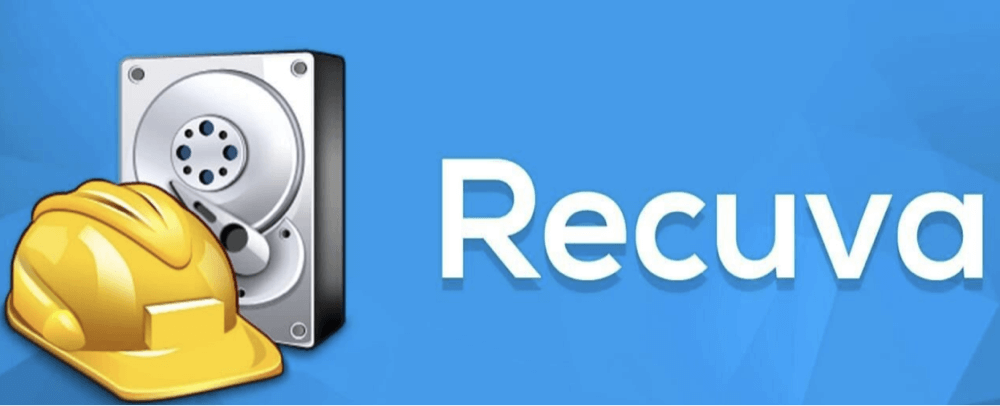
What is Recuva?
Recuva is a data recovery tool developed by Piriform, the same company behind the well-known CCleaner software. It was designed to help users recover deleted files from various types of storage media, including hard drives, USB flash drives, memory cards, and even iPods.
Recuva runs on the Windows operating system and is available in both free and paid versions. While the free version offers basic file recovery, the Recuva Professional edition includes additional features such as virtual hard drive support and automatic updates.
Key Features of Recuva:
- File Recovery: Restores deleted files, including documents, images, videos, and emails.
- Deep Scan Mode: Thoroughly searches for lost files even after formatting.
- Secure Deletion: Overwrites deleted files to make them unrecoverable.
- Preview Feature: Allows users to preview files before restoring them.
- Portable Version: Can run without installation, ideal for emergency recoveries.
Pros of Recuva:
Recuva has remained a staple in many users' toolkits for good reason. Here are the key benefits:
1. Free to Use
The biggest advantage of Recuva is its availability as a free tool, making it highly accessible for casual users and those with minor recovery needs.
2. Simple and User-Friendly Interface
Recuva's interface is designed with beginners in mind. The recovery process is guided through a step-by-step wizard that simplifies complex actions.
3. Lightweight Application
With a small installation footprint, Recuva is easy on system resources. It's fast to install and won't slow down your system during operation.
4. Preview Functionality
The preview option helps users identify which files are recoverable, saving time and avoiding unnecessary restores.
5. Secure Deletion Feature
In addition to recovery, Recuva includes a file shredder, allowing users to permanently delete sensitive data.
Cons of Recuva:
Despite its popularity, Recuva has some serious limitations that affect its usability and reliability, especially for advanced or critical recovery tasks.
1. Windows-Only
One of the biggest downsides is that Recuva does not support macOS. This excludes a significant number of users from using the tool.
2. Outdated Interface
While functional, Recuva's interface hasn't seen significant updates in years. It feels dated compared to modern applications with sleeker UIs.
3. Inconsistent Recovery Results
In many test cases, Recuva fails to recover files that have been overwritten or are located on corrupted partitions. Deep scan also struggles with fragmented files.
4. Lack of Advanced Features
Unlike more sophisticated data recovery tools, Recuva doesn’t offer partition recovery, RAID support, or bootable recovery media.
5. Limited Updates and Support
Since Piriform was acquired by Avast, Recuva's development has slowed. Updates are infrequent, and customer support is minimal, especially for the free version.
Recuva: User Experience and Performance
Installation and Setup
Recuva is easy to install and takes up minimal disk space. Users can also opt for the portable version, which doesn't require installation and can run from a USB drive.
Recovery Process
Once launched, Recuva opens a wizard that asks users what types of files to recover (documents, pictures, videos, etc.) and where to search (specific folders, entire drives). After initiating a scan, results are shown in a list with color-coded recoverability indicators (green = excellent, orange = poor, red = unrecoverable).
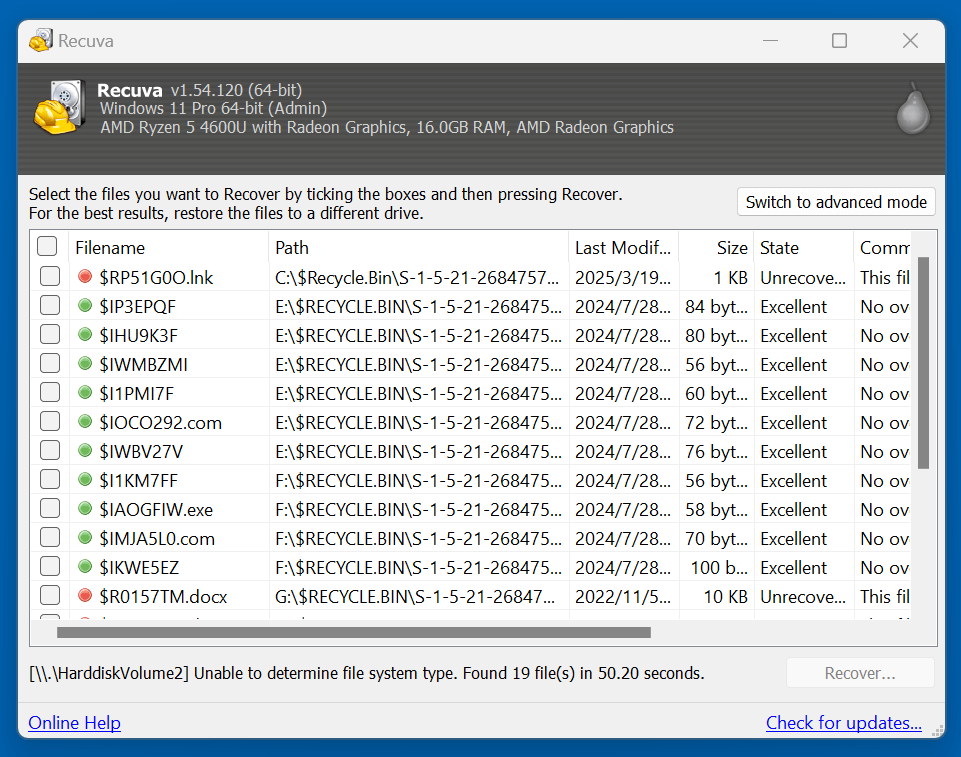
Performance
In performance tests on Windows 10:
- Quick Scan: Completed in under 2 minutes but failed to detect recently deleted files.
- Deep Scan: Took over 30 minutes for a 500GB HDD and recovered partial files.
- Success Rate: Recovered around 60-70% of deleted files, with many showing signs of corruption.
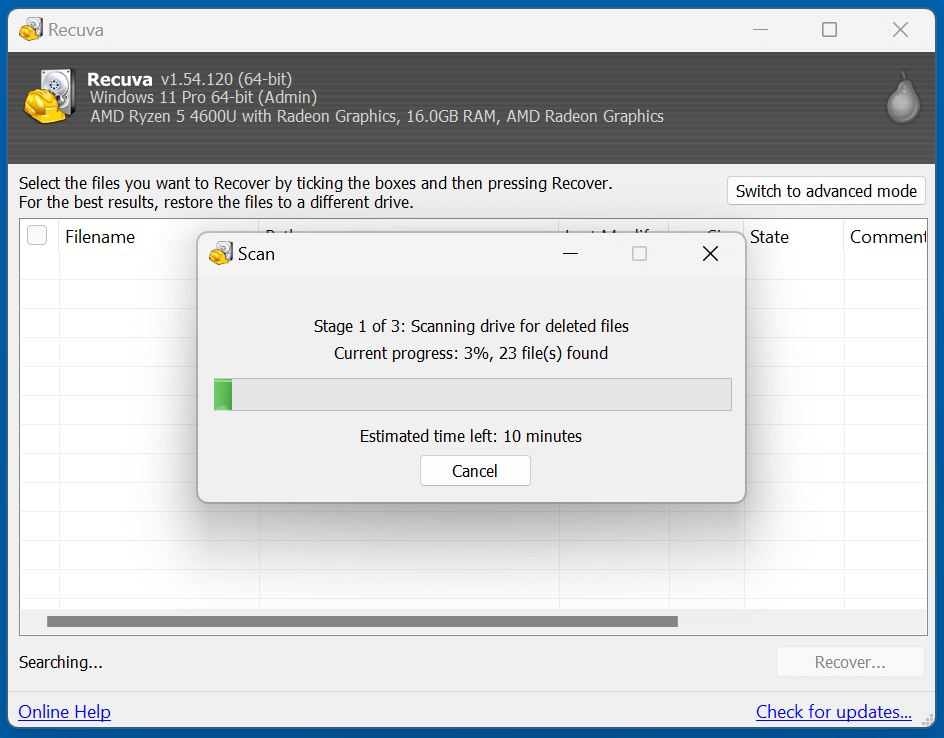
User Ratings Summary
- Trustpilot: Mixed reviews, average rating of 3.2/5.
- CNET: 3.5/5, citing ease of use but poor recovery depth.
- Reddit/Forums: Users often recommend it for basic tasks but suggest alternatives for serious recovery needs.
When is Recuva a Good Choice?
Recuva is a solid choice if:
- You're a Windows user.
- You accidentally deleted files and need a quick recovery.
- You want a free tool for basic recovery.
- You prefer a lightweight and simple application.
However, for more serious data loss scenarios - like formatted drives, RAW partitions, system crashes, or external drive failures - Recuva's capabilities fall short.
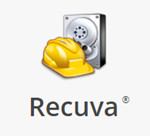
(Solved) Recuva Can't Find My Lost Files
Can't find the lost files after Recuva scans the drive? Don't worry, here is the guide to get all lost files back.
Better Alternative to Recuva: Donemax Data Recovery
When Recuva falls short in recovering your lost data - especially in cases involving formatted drives, corrupted partitions, or large external storage devices - a more sophisticated solution is required. This is where Donemax Data Recovery emerges as a superior alternative. It combines intuitive design, advanced recovery algorithms, and professional-level features that cater to both everyday users and IT professionals.
Overview of Donemax Data Recovery
Donemax Data Recovery is a powerful data recovery software developed by Donemax Software, available for both macOS and Windows. It is designed not just to recover deleted files, but also to handle complex recovery scenarios such as:
- Formatted drives
- RAW partitions
- Lost or deleted partitions
- System crashes
- External and internal drive failures
- Memory card and USB drive corruption
It supports recovery from virtually any storage device, including PCs, Macs, HDDs, SSDs, USB flash drives, SD cards, digital cameras, smartphones, and more.
Core Features That Make Donemax Data Recovery Stand Out
1. Universal File System Compatibility
Donemax Data Recovery can recover data from multiple file systems such as:
- NTFS, FAT/FAT32, exFAT
- HFS+, APFS (macOS)
- EXT3/EXT4 (Linux drives)
This gives it a significant edge over Recuva, which mainly supports Windows-based file systems only.
2. 2000+ File Formats Supported
Donemax Data Recovery uses intelligent deep scan algorithms to recognize and recover over 2000 file formats, including:
- Office documents (.docx, .xlsx, .ppt, etc.)
- Documents (.pdf, .text, .wps, etc.)
- Image files (.jpg, .png, .gif, .raw, etc.)
- Video files (.mp4, .avi, .mov, .mkv, etc.)
- Audio files (.mp3, .wav, .aac, etc.)
- Email files, archives, databases, and custom file signatures
This is especially useful for creatives, developers, and business users working with niche formats.
3. Deep Scan and Quick Scan
Donemax Data Recovery offers multiple scanning options:
- Quick Scan: Ideal for recently deleted files.
- Deep Scan: Reconstructs files even after complex loss scenarios, such as format, overwrite, or file system corruption.
The deep scan can analyze even RAW or unrecognized drives and restore data by file signature recognition.
4. Disk Manager Tool
Donemax Data Recovery can repair damaged drives, reformat RAW drives, etc. It also can help mount disk on Mac, repair corrupted device or reformat external drive on Mac.
5. Intuitive User Interface
Despite its power, Donemax Data Recovery offers a modern and streamlined UI. The dashboard is clean, with clear options for recovery and utility tools. Even beginners can perform complex recovery tasks with minimal learning curve.
Pricing and Value
Donemax Data Recovery offers a free trial that lets you scan and preview recoverable files and save 200MB files for free, which is great for testing its capabilities before purchase. To actually recover more files, you'll need to purchase the Full version, which is competitively priced at around $69.
The value for money is significant, considering the range of features and the high success rate.
Use Cases Where Donemax Data Recovery Excels
Here are common situations where Donemax Data Recovery outperforms Recuva:
- Recovering files from an SD card used in a DSLR camera after accidental format
- Retrieving lost files from a RAW external HDD
- Recovering partitions that were deleted during OS reinstallation
- Getting back critical documents from a macOS APFS drive
- Performing recovery on a drive with logical errors
- Cloning and recovering data from failing drives to prevent further damage
Here are the steps to use Donemax Data Recovery to recover deleted, formatted, inaccessible or lost data:
Step 1. Download and install Donemax Data Recovery on the computer.
Step 2. Open Donemax Data Recovery, then select the drive where you lose your files to start data recovery.
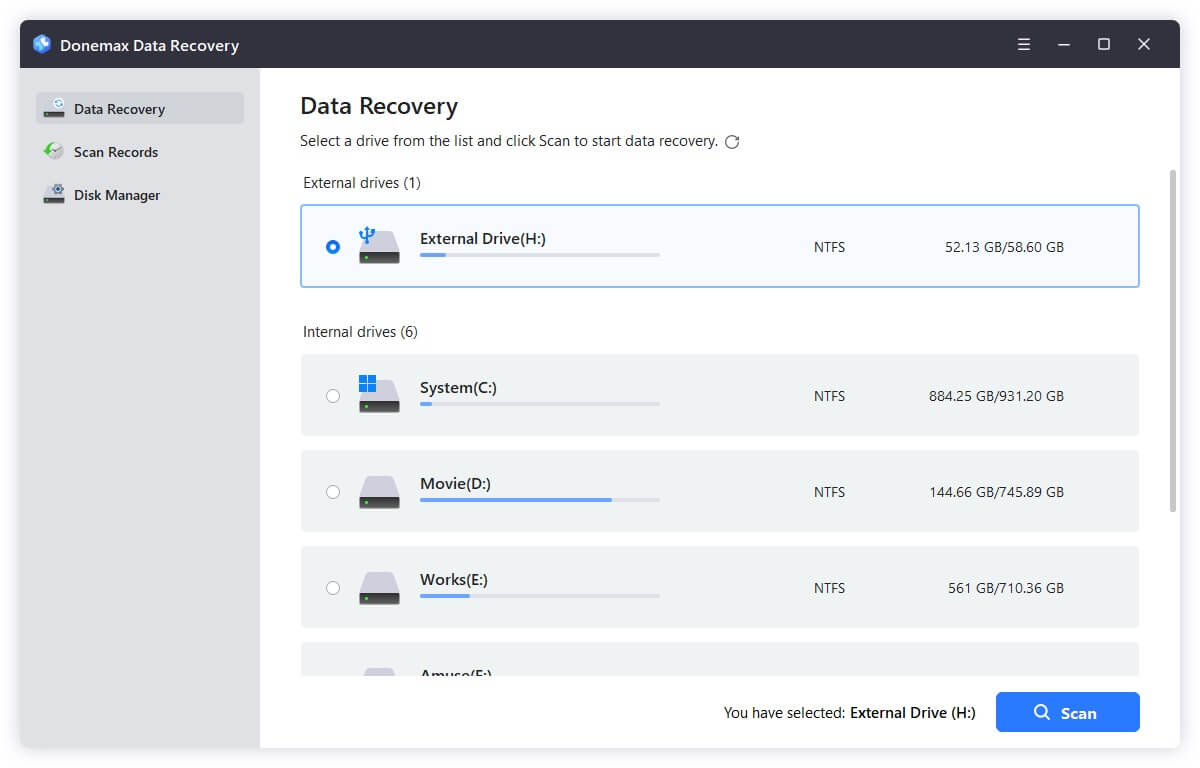
Step 3. Click on Scan button. Donemax Data Recovery will perform quick scan + deep scan to find all existing and lost files stored on the drive.
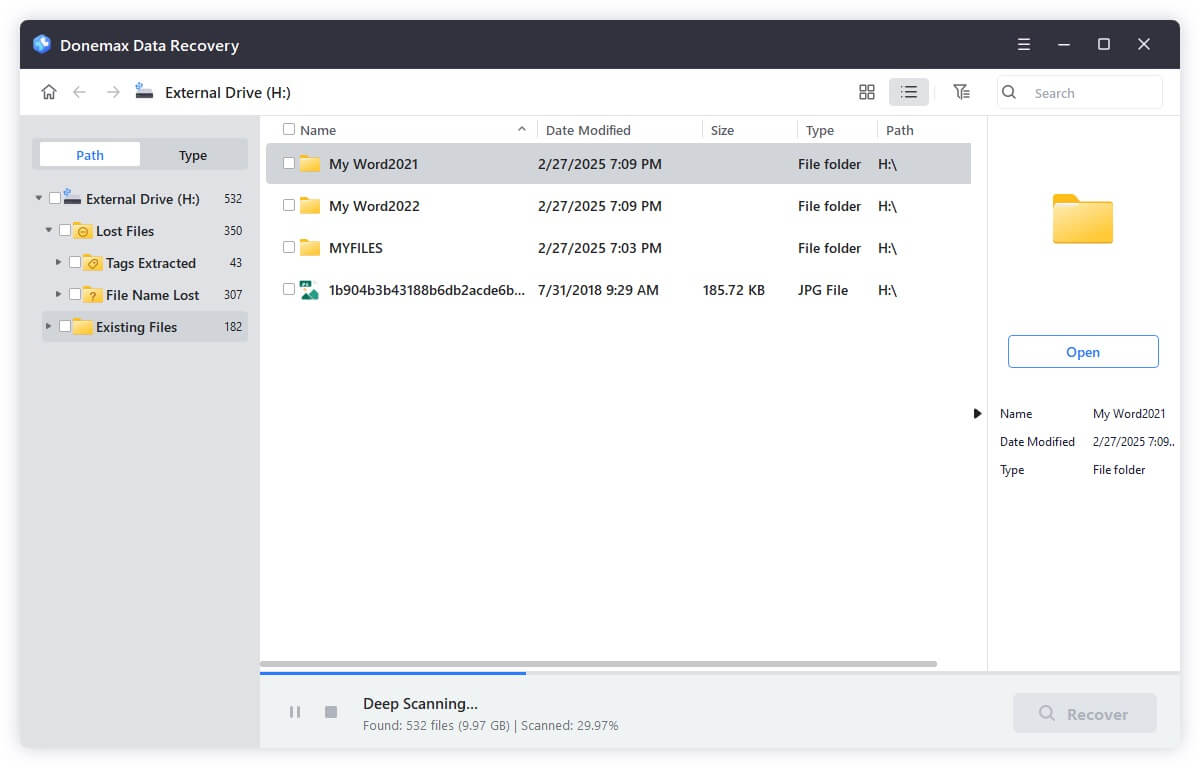
Step 4. After scan, you can preview all recoverable files. Then select the wanted files, click on Recover button to save them.
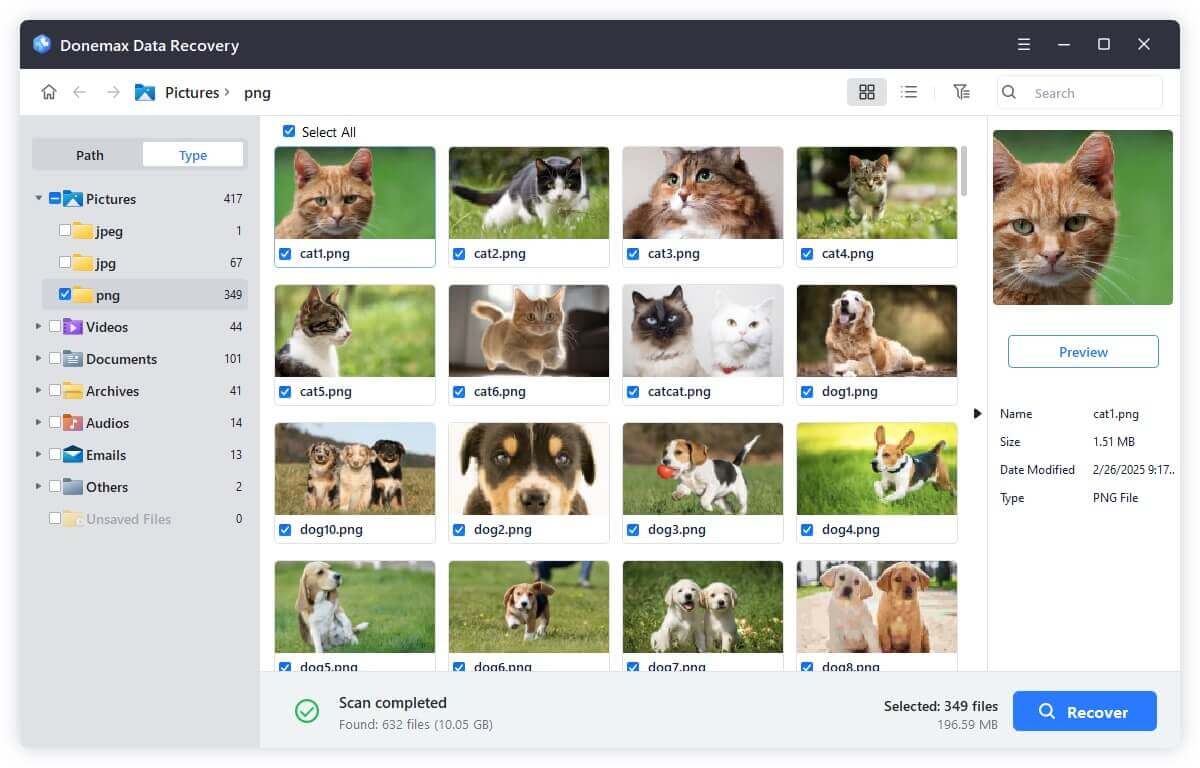
Other Noteworthy Alternatives
While Donemax Data Recovery is one of the best, other powerful Recuva alternatives include:
- Do Your Data Recovery: Excellent UI, partition recovery, available for Windows and macOS.
- Wondershare Recoverit: Strong performance in recovering video files and external drives.
- R-Studio: Professional-grade recovery for RAID, Linux, and more complex tasks.
- PhotoRec: Open-source option for technically advanced users; less user-friendly but powerful.
Conclusion
Recuva is a simple, free, and lightweight tool that serves its purpose for small, non-critical recovery tasks on Windows. However, it shows its age in both interface and functionality. For users facing more complex data loss or needing support across multiple platforms, it's not the most reliable choice.
If you want a more complete and dependable solution, Donemax Data Recovery is the better alternative. With better performance, broader compatibility, and more recovery features, it offers significantly more value - especially in serious data recovery situations.
Ultimately, your choice depends on your needs. Recuva may suffice for a quick undelete, but when your data really matters, going with a professional tool like Donemax Data Recovery ensures you have the best chance of getting it back safely.
FAQs About Recuva and Alternative
1. Is Recuva safe to use?
Yes, in our test, it is 100% safe and clean. But, you'd better download it from Recuva's official website: https://www.ccleaner.com/recuva.
2. Can Recuva recover data from an iPhone or Android phone?
No, it can't recover data from iPhone or Android Phone, but it supports to recover data from an SD card. You can remove the SD card from your Android phone, and connect it to your computer. Run Recuva to scan the SD and recover lost data.
3. Is there a Recuva for Mac version?
No, there is no Recuva for Mac. It only offers Windows version. If you want to recover lost data from a Mac, just try Donemax Data Recovery for Mac.
4. What is the best alternative to Recuva?
Here is the list of top 5 alternative to Recuva:
- Donemax Data Recovery
- Do Your Data Recovery
- PhotoRec
- Wondershare Recoverit
- R-Studio Data Recovery
5. Is Recuva 100% free?
Yes, the free version can recover unlimited deleted files. But if you want to recover lost data from more complex situations, you need upgrade to Pro/Pro Plus version or use other recovery tools.


Donemax Data Recovery
One of the best data recovery programs to recover deleted, formatted or lost data from PC, Mac, HDD, SSD, USB drive, SD card, camera, RAID, Sever or other storage devices.
Related Articles
- May 28, 20254 Methods to Recover Deleted EPS File: A Complete Guide
- May 29, 2025How to Recover Lost Data from a Damaged/Corrupted Partition?
- Jun 06, 2025How to Recover Deleted ASF Files? [4 Methods]
- Mar 01, 2025How to Recover Lost Data from ADATA SD Card?
- Jun 20, 2025Recover Deleted GIF Files: A Complete Guide
- Jan 15, 2024How to Recover Lost Data from Crucial SSD?

Charles
Charles, who lives in Sydney, Australia, is an editor & writer of Donemax Team. He is good at writing articles related with Apple Mac computers, Windows operating systems, data recovery, data erasure, disk clone and data backup, etc. He loves reading and playing tennis in his spare time and is interested in testing new digital devices such as mobile phones, Macs, HDDs, SSDs, digital cameras, etc.

Gerhard Chou
In order to effectively solve the problems for our customers, every article and troubleshooting solution published on our website has been strictly tested and practiced. Our editors love researching and using computers and testing software, and are willing to help computer users with their problems